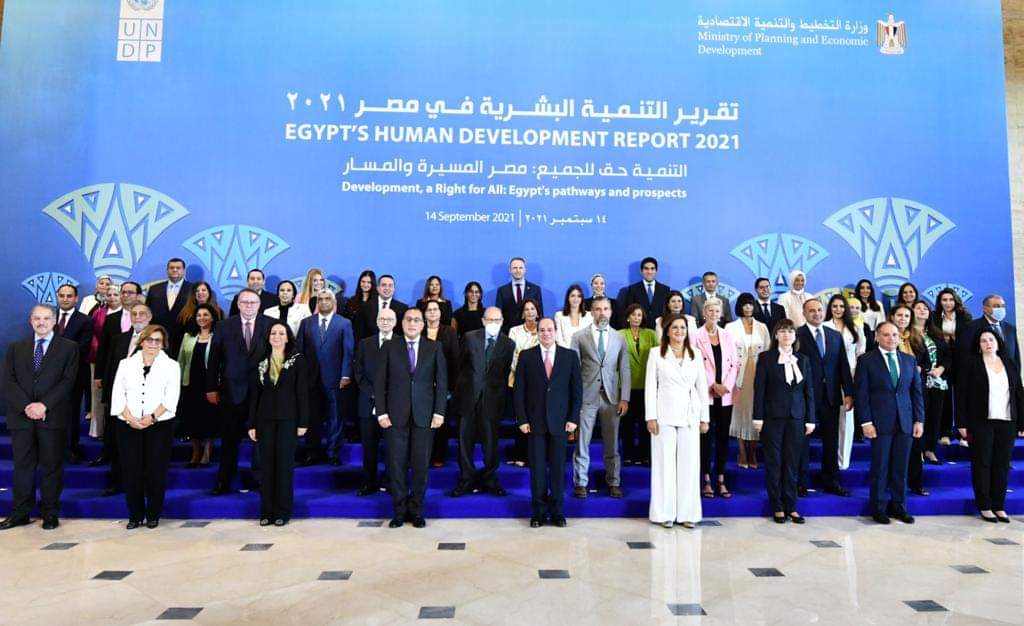Human Development Reports transform poverty reduction and human development goals into action plans: Minister of Planning& Economic Development

14 September 2021
During her speech at the conference to launch the Human Development Report in Egypt 2021
Human Development Reports transform poverty reduction and human development goals into action plans: Minister of Planning& Economic Development:
Cairo on September 14, 2021
Dr. Hala El-Said, Minister of Planning and Economic Development, said that the Human Development Report in Egypt 2021 is one of the most important international reports that monitor the status of human development in the world.
She added that Egypt is proud of being one of the first countries that were keen to document the state of human development; noting that 11 reports have been issued since 1994, and this year's report is the twelfth edition.This came during her speech today at the conference to launch the Human Development Report in Egypt 2021; under the title "Development is a Right for All: Egypt: March & Path".The launch event witnessed the presence of President Abdel Fattah El-Sisi.Dr. Hala El-Said pointed out that the Human Development Report was first issued in 1990 by Pakistani economist Mahbub-ul-Haq and Indian thinker Amartya Sen; Nobel laureate in economics.El-Said emphasized that the production of human development reports around the world contributes to strengthening national capacities to collect and analyze data related to human development and raise awareness of human development issues.
El-Said said that the key to the work that we celebrate launching today is the term partnership; this partnership is present in the report's title "Development is a right for all", as gathering benefits the sharing of development efforts and its returns.The partnership is also present in its concept through the close and extended development cooperation relationship with the United Nations Development Program that is considered as one of the most important organizations and houses of development expertise.El-Said continued that the report reflects the capacity of the Egyptian state and its keenness to produce and make data available. The report also deals in depth with all development issues and their concerns. This makes him an accurate observer of the state of development in Egypt, with its challenges and achievements.El-Said pointed out that Egypt Human Development Report in 2021 came to monitor the march of a full decade of the life of the country and to draw the features of the path for a future that we see as good, we want it to be bright, and we work with determination to achieve it.Dr. Hala El-Said confirmed that the work process started seven years ago, based on comprehensive planning and an ambitious vision for the future, the features of which were defined by the "Sustainable Development Strategy: Egypt Vision 2030" as the national version of the UN goals to achieve sustainable development.El-Said said that the state knows perfectly well that achieving economic growth and improving economic indicators and recovery; will not have value or resonance unless it is positively reflected on the level of citizen's life, which is consistent with the concept adopted by the United Nations Development Program since 1990 to define and measure development.El-Said added that the Egyptian state seeks to mobilize all available capabilities and resources to expand public investments, which increased by more than seven times their value between 2014 and 2021, to implement major development projects and initiatives in all sectors.El-Said also referred to the presidential initiative to implement the national project for the development of the Egyptian countryside: (A Decent Life); which aims to change the face of life for the better for more than half of Egypt's population in villages and rural areas.
“It is a purely Egyptian development experience; the initiative is considered the largest comprehensive and integrated development initiative in the world, both in terms of the size of its financial allocations or the size of its beneficiaries,” El-Said explained.
Dr. Hala El-Said confirmed that all these efforts resulted in many positive indicators, especially in high growth rates, declining unemployment rates, and low inflation.
“A trilogy that experts and those concerned with economic affairs know the difficulty of achieving together until a new challenge emerged, represented in the pandemic of the spread of Covid-19 virus.” She said.
El-Said pointed out that the reform efforts achieved by the Egyptian state in recent years have been credited with enhancing the ability of the Egyptian economy to withstand this pandemic, so the Egyptian experience in dealing with the pandemic has received international praise.
Dr. Hala El-Said also referred to the challenges that the state is working to confront, foremost of which is the issue of climate change and the issue of population growth, which increases the imbalance between the size of the population and the available resources and negatively affects the per capita share of development returns.









